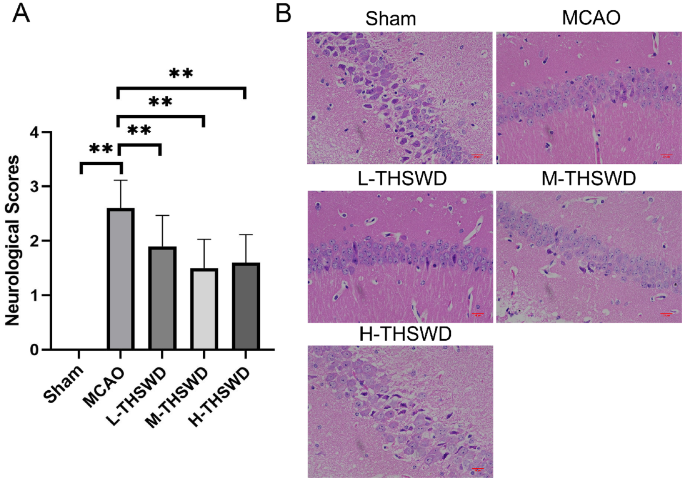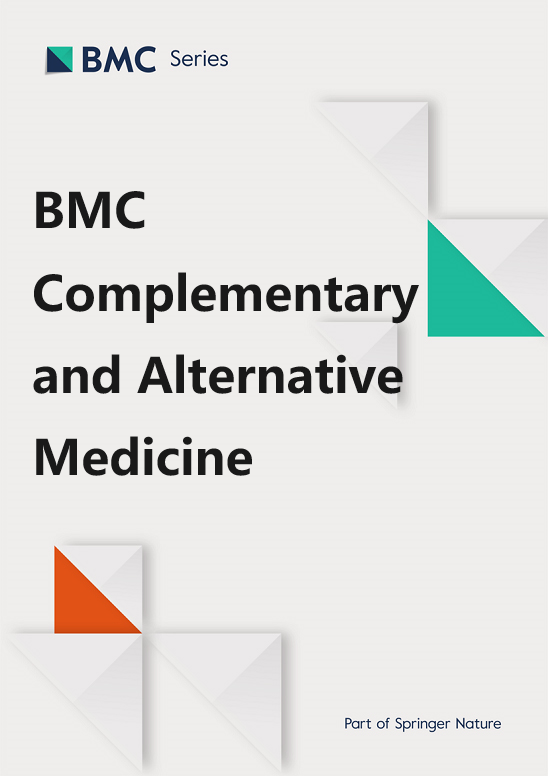Protective effect of Tao Hong Si Wu Decoction against inflammatory injury caused by intestinal flora disorders in an ischemic stroke mouse model
IF 3.4
2区 医学
Q1 Medicine
引用次数: 0
Abstract
Recent studies have shown that intestinal flora are involved in the pathological process of ischemic stroke (IS). The potential protective effect of the traditional Chinese prescription, Tao Hong Si Wu Decoction (THSWD), against inflammatory injury after IS and its underlying mechanisms of action were investigated in the current study. Fifty SPF(Specefic pathogen Free) male C57 mice were randomly assigned to sham operation, model, THSWD low-dose (6.5 g/kg), medium-dose (13 g/kg) and high-dose (26 g/kg) groups (10 mice per group). Mouse models of transient middle cerebral artery occlusion were prepared via thread embolism. Neurological function score, hematoxylin-eosin (HE) staining, immunohistochemistry, enzyme-linked immunosorbent assay (ELISA), 16S ribosomal DNA (rDNA) sequencing, quantitative reverse transcription PCR (qRT-PCR) and other methods were employed to elucidate the underlying molecular mechanisms. Notably, THSWD induced a reduction in the neurological function score (P < 0.01) and neuronal injury in brain tissue, increase in protein expression of Claudin-5 and zonula occludens-1 (ZO-1) in brain tissue(P < 0.01), and decrease in serum lipopolysaccharide (LPS)(P < 0.01), diamine oxidase (DAO)(P < 0.01) and D-lactic acid(P < 0.01, P < 0.05) levels to a significant extent. THSWD also inhibited the levels of tumor necrosis factor-α (TNF-α)(P < 0.01) and interleukin − 1β (IL-1β)(P < 0.01) in brain tissue, and increased alpha and beta diversity in ischemic stroke mice, along with a certain reversal effect on different microflora. Finally, THSWD inhibited the polarization of microglia cells(P < 0.01) and decreased the protein and gene expression of toll-like receptor-4 (TLR-4)(P < 0.01, P < 0.05) and nuclear factor kappa B (NF-κB)(P < 0.01) in brain tissue. Our data indicate that THSWD may interfere with inflammatory response in ischemic stroke by regulating intestinal flora and promoting intestinal barrier repair.

桃红四物汤对缺血性中风小鼠模型肠道菌群失调所致炎症损伤的保护作用
最近的研究表明,肠道菌群参与了缺血性中风(IS)的病理过程。本研究探讨了中药桃红四物汤对缺血性中风后炎症损伤的潜在保护作用及其作用机制。将 50 只 SPF(Specefic pathogen Free)雄性 C57 小鼠随机分为假手术组、模型组、桃红四物汤低剂量组(6.5 克/千克)、中剂量组(13 克/千克)和高剂量组(26 克/千克)(每组 10 只)。通过螺纹栓塞制备一过性大脑中动脉闭塞小鼠模型。采用神经功能评分、苏木精-伊红(HE)染色、免疫组织化学、酶联免疫吸附试验(ELISA)、16S核糖体DNA(rDNA)测序、定量反转录PCR(qRT-PCR)等方法阐明其分子机制。结果表明,THSWD能显著降低神经功能评分(P<0.01)和脑组织神经元损伤,增加脑组织Claudin-5和Zonula occludens-1(ZO-1)蛋白表达(P<0.01),降低血清脂多糖(LPS)(P<0.01)、二胺氧化酶(DAO)(P<0.01)和D-乳酸(P<0.01,P<0.05)水平。THSWD 还能抑制脑组织中肿瘤坏死因子-α(TNF-α)(P<0.01)和白细胞介素-1β(IL-1β)(P<0.01)的水平,增加缺血性中风小鼠的α和β多样性,并对不同的微生物区系有一定的逆转作用。最后,THSWD抑制了小胶质细胞的极化(P<0.01),降低了脑组织中toll样受体-4(TLR-4)(P<0.01,P<0.05)和核因子卡巴B(NF-κB)(P<0.01)的蛋白和基因表达。我们的数据表明,THSWD 可通过调节肠道菌群和促进肠道屏障修复来干扰缺血性中风的炎症反应。
本文章由计算机程序翻译,如有差异,请以英文原文为准。
求助全文
约1分钟内获得全文
求助全文
来源期刊

BMC Complementary and Alternative Medicine
INTEGRATIVE & COMPLEMENTARY MEDICINE-
CiteScore
7.00
自引率
0.00%
发文量
0
审稿时长
3 months
期刊介绍:
BMC Complementary Medicine and Therapies is an open access journal publishing original peer-reviewed research articles on interventions and resources that complement or replace conventional therapies, with a specific emphasis on research that explores the biological mechanisms of action, as well as their efficacy, safety, costs, patterns of use and/or implementation.
 求助内容:
求助内容: 应助结果提醒方式:
应助结果提醒方式:


